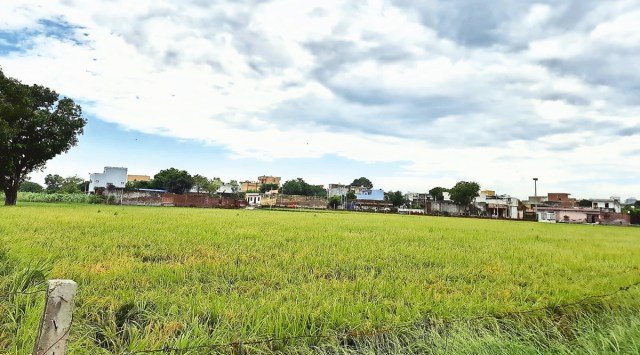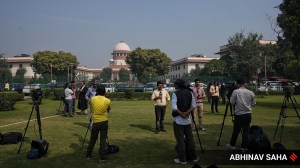- India
- International
Delhi: A year after first trying it, farmers warm up to Pusa decomposer, officials plan to ramp up use
Used to decompose paddy stubble after a harvest and prevent stubble burning, the decomposer was sprayed on around 30 acres of farmer Umesh Singh’s farmland in Hiranki village last year.
 Farmers say decomposer has improved soil fertility. (Express photo)
Farmers say decomposer has improved soil fertility. (Express photo)With the wheat-growing rabi season right around the corner, the Pusa bio-decomposer that made its debut in fields last year is on the minds of farmers in North Delhi.
Used to decompose paddy stubble after a harvest and prevent stubble burning, the decomposer was sprayed on around 30 acres of farmer Umesh Singh’s farmland in Hiranki village last year. Singh is prepared to harvest the crop by the end of the month, but awaits clarity on use of the decomposer this year and whether it will be provided again.
Prakash Singh also had the decomposer sprayed on around 3 acres in Hiranki. It can take about 20 to 22 days for stubble to decompose, he said. The decomposer has also helped improve soil fertility and reduced the need for extensive ploughing to mix stubble with soil, Singh said. By the time farmworkers from Bihar arrive to sow the wheat, the land is free of stubble, he added.
 Pointing to a field of paddy ready to be harvested, Jasram, a farmer in nearby Palla village, said the decomposer has reduced the need for fertiliser. “Where the decomposer was sprayed, we used very little urea as fertiliser and absolutely no potash. Usually around four bags of fertiliser are necessary for an acre of land,” he said.
Pointing to a field of paddy ready to be harvested, Jasram, a farmer in nearby Palla village, said the decomposer has reduced the need for fertiliser. “Where the decomposer was sprayed, we used very little urea as fertiliser and absolutely no potash. Usually around four bags of fertiliser are necessary for an acre of land,” he said.
What did he do to get rid of stubble before the decomposer was introduced last year? Burning is common even in Delhi, he said. “It’s easy to strike a match and get rid of stubble immediately. Most farmers want to clear the field immediately and sow vegetable crops in Palla. Some might not be willing to wait for over 20 days to allow the stubble to decompose, and that could lead to some hesitation in using it,” he said. The paddy is ready for harvesting in some fields, like his own, but there has been no information from the government yet on whether or not the decomposer will be made available.

But Jasram is willing to purchase the decomposer separately this year, even if the government does not provide it, since the benefits of low fertiliser use outweigh the time taken to clear the field, he said.
Om Veer Chauhan in Jhangola village also had the decomposer sprayed, but remains skeptical. “It was only sprayed on some pockets of land last year. Without the decomposer, we would irrigate the fields, leave it for a while and turn the soil to get rid of the stubble. This is not very different from that process,” he said.
It was sprayed on around 2,000 acres of land in Delhi, of which around 458 acres was in North Delhi. The rest was in parts of Southwest and Northwest Delhi.
Indramani Mishra, head of the Agricultural Engineering Department at the Indian Agricultural Research Institute where the decomposer was developed, said it is likely to be used more extensively this year. It has been licensed to nine companies for production, he said.
“Last year, we manufactured it in-house and it was sold at a cost of Rs 20 for a pouch of four capsules. One pouch is diluted to generate a solution of around 25 litres. The Delhi government has given us an intent to purchase around 3,000 pouches of capsules, and they have approached us for 1,000 more. The companies that have taken a license from us are covering areas in Punjab and Haryana. Individual farmers are also approaching licensees,” he said.
Apr 26: Latest News
- 01
- 02
- 03
- 04
- 05








































